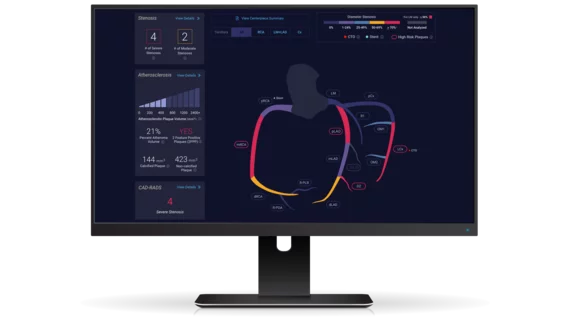Cardiology startup raises $192M for AI-powered imaging assessments
Cleerly, a New York City-based healthcare startup focused on using artificial intelligence (AI) to evaluate plaque buildup in cardiac CT findings, has closed a Series C financing round worth $192 million. The new funding is expected to help the company bring in additional employees and expand its commercial reach.
“At Cleerly, we are passionate about our mission to create a new standard of care for heart disease,” James Min, MD, CEO and founder of Cleerly, said in a statement. “We are grateful for this round of financing that will further enable our work and believe it provides a resounding vote of confidence in our vision for the future of cardiovascular care. The status quo for heart health simply isn't good enough—for patients, providers, or payors—and our proven approach to examining for early signs of heart disease through the build-up of arterial plaque promises to deliver the change we need right now.”
Min is a pioneer in cardiac CT and a former president of the Society of Cardiovascular Computed Tomography (SCCT). He recently left clinical practice to head the company, which he also helped found.
Cleerly’s FDA-cleared algorithm was designed to provide users with a complete assessment of each coronary artery and branch, identifying and quantifying any plaque as part of a comprehensive report. The company has now raised $248 in total.
AI-powered soft plaque assessments gaining momentum in the cardiology, radiology markets
Cleerly is one of multiple companies currently working on AI-powered, CT-based plaque evaluations. The technology’s potential was one of the hottest topics at the recent SCCT 2022 meeting in Las Vegas.
“This is a really excited area right now, where we can use AI to process the CT images and pull in a new wealth in data,” Ron Blankstein, MD, associate director of cardiovascular imaging and director of cardiac CT at Brigham and Women’s Hospital in Boston, told us at the meeting. “This is something that today takes a long time to do manually, which is why nobody really uses this in clinical care. But this is going to be the future, where with every coronary CTA, we will be able to provide a very detailed report about how much plaque someone has. Ultimately, this will tell us the amount of risk a patient has and the amount of benefit a patient might get from preventive therapies.”
Click here for a new a video about this emerging technology.

